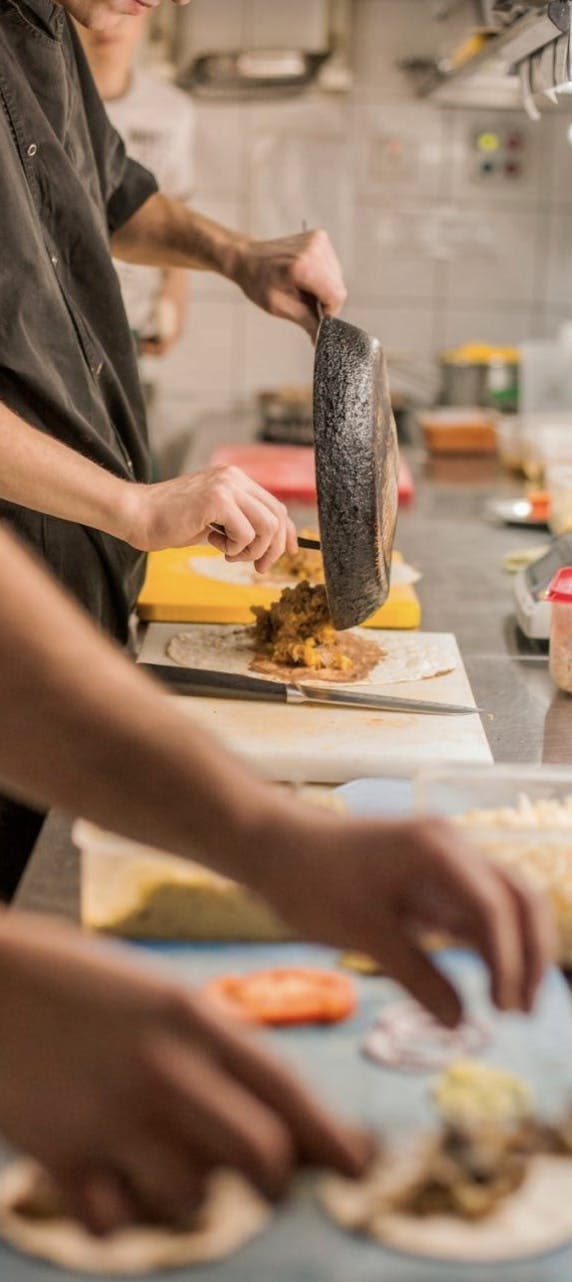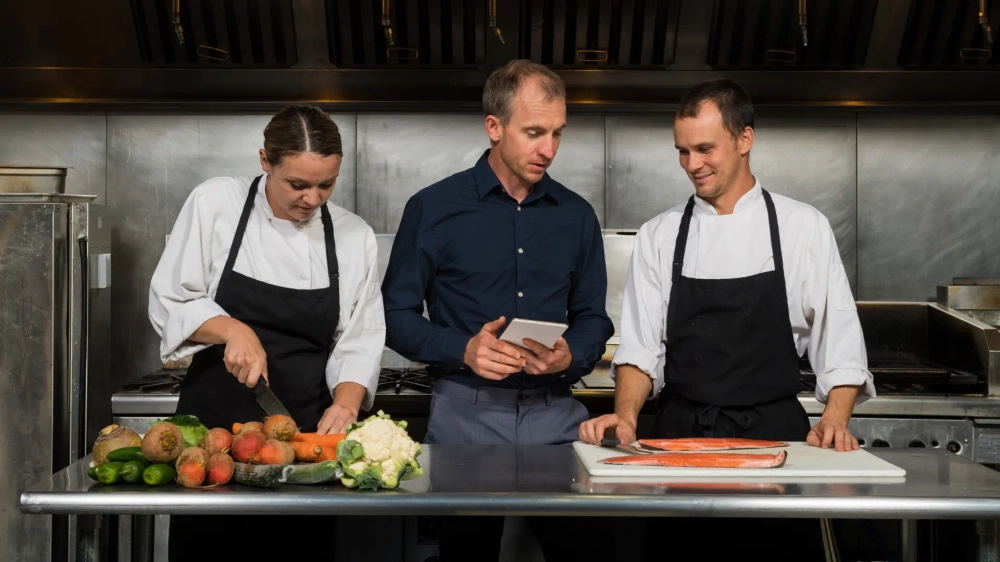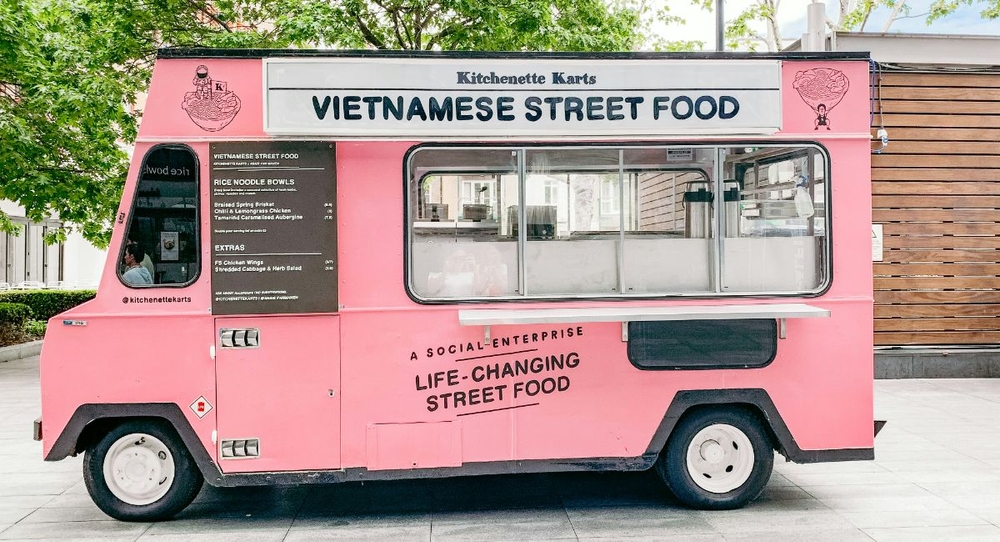What are the main licenses and authorizations for catering businesses?
Table of Contents
CloudKitchens
How many tacos can be delivered from a 1000sqft restaurant?
The same amount as a 200sqft ghost kitchen.
If you’re considering opening a catering business, the economic forecast is in your favor. The sector as a whole is predicted to expand by 7.7% annually over the coming years—far greater than the average for all industries of just 0.4%.
However, before you can start serving your signature dishes at weddings, birthdays, and corporate events, you’ll need to obtain the proper documentation and a catering kitchen to prepare your food. Catering licenses and permits, including a business license and clearance from your local health department, are required to operate legally.
While every state’s exact requirements are different, this guide will detail the general credentials you need to run a catering business. It’ll also explore the potential consequences of operating without the correct licensure and offer some essential insight into starting your company quickly and cost-effectively.
Read More: All About California Food Licenses and Permits
What documentation do you need to start a catering company?
As mentioned, the exact permits you’ll need, their specific names, and the process for obtaining them will vary across the United States. Regardless, there are three general pieces of documentation you’ll have to secure before catering your first event in any state:
1. A business license
Catering isn’t a nationally regulated activity, so you’ll apply for your business permit at the state rather than federal level.
In California, for instance, the state delegates business permits to local governments, meaning you’ll have to apply through your city or county. The cost is anywhere from $15 to several hundred, and you’ll need to renew either annually or every other year depending on your area.
Obtaining a business license is essential because:
- It’s how you pay taxes in your jurisdiction—a necessary part of running any business
- You open yourself up to fines for operating without one
- They lend legitimacy to your business, especially when you’re just starting out
Summarizing the most important points for obtaining a business license for a catering operation:
- How to Obtain:Check your district’s zoning legislation, then contact the responsible agency in your state or district;
- Cost: Between $15 and several hundred dollars, depending on the state or district;
- Renewal: Varies by state and district, but is usually annual.
Read More: Food Quality Control: What it is and how to apply in delivery
2. Health department clearance
Just like any brick-and-mortar restaurant, catering businesses are subject to the same health and safety standards covering all food preparation. Once again, food safety permits aren’t a concern of the federal government, so you’ll have to contact your local health department to get your hands on one.
Let’s return to the Sunshine State for some insight into the process. The state leaves the issuance of Public Health Permits up to individual counties, so you’ll have to contact your local health department to schedule an inspection.
Once an inspector has the time to grade your food preparation facilities, they’ll make their way into your kitchen and ensure:
- You have adequate handwashing stations, and your employees are actively using them
- Your staff isn’t sick, and they understand the essentials of safe food preparation
- You’re using proper hot and cold storage methods
- Your countertops and other surfaces are clean and sanitary
- Other basic hygiene and health standards are being met
If your food prep area is up to snuff, the inspector will issue (or renew) your Public Health Permit. If there are violations, however, the inspector will generally give you the opportunity to fix them on the spot (if possible) or point them out and shutter your business until they’re remedied. Then, they’ll schedule another inspection within 14 days to ensure you’re upholding the health and safety code.
The Department of Health can inspect your kitchen at almost any time, but generally only aims to do so:
- Right before you first open
- When they receive a complaint
- Three times a year if you handle “dangerous” ingredients such as raw meat
Complying with health and safety requirements is essential for any food service business. Failure can result in unsafe, contaminated meals making their way to your clientele and getting them sick. Not only would this be devastating to your business’s reputation, but it can also result in permanent closure.
- How to Obtain: This regulation isn’t handled at the national level, so you’ll need to contact the responsible agency in your specific state;
- Cost: Obtaining costs also vary and must be verified with each state’s health department;
- Renewal: Renewal periods vary from state to state, but it usually needs to be renewed annually.
Read More: How to Start a Catering Business: Step-by-Step Guide
3. A liquor license
A liquor license isn’t necessary for all catering businesses but, if you plan to serve alcohol at your events, you’ll need to obtain one. Unlike business licenses and health permits, liquor is regulated by the federal government, so you’ll need to apply for a license through the Alcohol and Tobacco Tax and Trade Bureau.
Fortunately, applying is free and can be done quickly through the bureau’s website. Plus, the license generally lasts the lifetime of your business.
However, alcohol is also regulated at the state and county level. This means you’ll need to apply through local government entities to sell legally in your area as well.
Failure to comply with federal standards and obtain a liquor license can result in fines of up to $100,000 per year. Local penalties vary across the country, but regardless, they can subtract a portion of your profits, too. To that end, be sure to adhere to all liquor laws at the state and federal levels.
- How to Obtain: The application must be submitted to the national agency, the Alcohol and Tobacco Tax and Trade Bureau (TTB). Be aware that specific regulations may exist for each state;
- Cost: There are no fees for the national application, but local regulations could lead to costs around a few hundred dollars;
- Renewal: The national authorization lasts for the entire lifespan of your business. However, regional permits should be checked on a case-by-case basis.
4. Buffet or Restaurant Food Service Permit
There isn’t a national law covering food services, restaurants, or catering, so each state has its own specific regulations. It’s very common for states and districts to require, in addition to the Food Handler’s Permit (which we’ll cover next), some other specific authorization for the food sector.
Depending on the state, this might be a general document, like a “Restaurant Food Service License,” or it could be specific to buffet and catering services.
These licenses are often connected to health permits or local zoning codes. You can also consult the “U.S. Food & Drug Administration (FDA) Guide” for more detailed information on your state’s regulations.
- How to Obtain: This is typically related to your health permit or can be verified with the “U.S. Food & Drug Administration (FDA) Guide”;
- Cost: Costs vary depending on the specific state or district;
- Renewal: They usually last for one year, but with different expiration dates in each state or district.
5. Food Handler’s Permit
The Food Handler’s Certification isn’t specific to catering services; rather, it’s required for any activity involving food preparation. Another key aspect is that it’s not a permit for the establishment itself, but for the individual responsible for preparing and handling the food.
Simply put, this means everyone working with you who comes into contact with the food served to customers must have this authorization. It serves as a protection for clients, ensuring that those preparing the dishes understand the necessary precautions to prevent foodborne illnesses.
The method and costs of obtaining this permit can vary depending on the state or district. You can check some specific cases like:
- Food Handlers Permit in Austin, TX
- Food Handlers Card In LA
- Food Handler’s Permit in NYC
- Food Handlers License in Seattle
- Food Handlers Permit in Dallas, Texas
- Food Handlers Permit in Philadelphia, Pennsylvania
- Food Handlers License in San Diego, CA
- Food Handlers License in Kansas City
The most important points regarding the food handler’s license are:
- How to Obtain: The processes for obtaining these are determined by individual districts and states;
- Cost: Costs vary depending on the state or district, but typically range between $15 and $50;
- Renewal: The renewal period usually varies from 1 to 5 years, depending on the specific state or district. It’s recommended to start the renewal process at least 30 days before your permit expires.
6. Employer Identification Number (EIN)
The Employer Identification Number (EIN) is a 9-digit identification number issued by the Internal Revenue Service (IRS) to register business entities.
This registration identifies your business to the federal tax authorities, allowing you to collect taxes, open business bank accounts, apply for licenses, and most importantly, hire employees for your establishment.
- How to Obtain: It can be requested via the IRS EIN Assistant tool;
- Cost: Obtaining the registration is free of charge;
- Renewal: The registration does not expire and therefore does not need to be renewed.
Read More: What is Catering: History, Main Types and Current Scenario
What are the consequences of not obtaining these licenses?
As noted, the penalties for starting a catering business without the proper documentation vary depending on the severity of the misconduct. For instance, in early 2024, a South Carolina man was arrested and charged with ten counts of operating a retail business without a license when he failed to get the correct permits for his restaurant.
Ultimately, obtaining proper licensure is essential to the success and longevity of your catering business.
Get your catering company up and running faster
When you partner with CloudKitchens, you can start your catering business in just weeks, rather than months, as you’ll have access to one of our legal ghost kitchens on day one. You also don’t have to worry about the extra overhead that comes with opening a traditional brick-and-mortar restaurant. Instead, you can use that cash to obtain all of the licenses you need.
Wherever you’re operating your catering business, there’s sure to be a CloudKitchen near you. Reach out today to schedule a tour, and start your business on the right foot.
Explore ghost kitchen locations across the US:
- Ghost kitchens in Seattle
- Ghost kitchens in San Francisco
- Ghost kitchens in LA
- Ghost kitchens in NYC
- Ghost Kitchens in Toronto
- Ghost Kitchens in Atlanta
- Ghost Kitchens in Dallas
- Ghost Kitchens in Chicago
- Ghost Kitchens in Denver
- Ghost Kitchens in Miami
| DISCLAIMER: This information is provided for general informational purposes only and the content does not constitute an endorsement. CloudKitchens does not warrant the accuracy or completeness of any information, text, images/graphics, links, or other content contained within the blog content. We recommend that you consult with financial, legal, and business professionals for advice specific to your situation. |
Read more:
- Buffet vs. Catering: Key Differences and How to Choose
- What is Catering? Understanding the Business | CloudKitchens
- Top 7 profitable catering food ideas to elevate your business to the next level!
- Catering Service Insurance: Protect Your Catering Business
- Catering Software Solutions for your Operations: How to Choose
Sources:
Grand View Research. U.S. Catering Services Market Size, Share & Trends Analysis Report By Type (Workplace/ Office Catering, Event Catering), And Segment Forecasts, 2023 – 2030. https://www.grandviewresearch.com/.
Statista. Global Industry Forecasts. https://cdn.statcdn.com/.
United States Small Business Administration. Apply for licenses and permits. https://www.sba.gov/.
Forbes. How To Get A Business License In California (2024 Guide). https://www.forbes.com/.
County of Los Angeles Department Of Public Health. REFERENCE GUIDE FOR THE FOOD OFFICIAL INSPECTION REPORT. http://lapublichealth.org/.
County of Los Angeles Public Health. Restaurant and Retail Food Inspections. http://ph.lacounty.gov/.
Los Angeles Times. A colleague’s suicide exposes a crisis among L.A.’s restaurant inspectors. https://www.latimes.com/.
Alcohol and Tobacco Tax and Trade Bureau. Applying for a Permit and/or Registration. https://www.ttb.gov/.
National Archives and Records Administration. PART 31—ALCOHOL BEVERAGE DEALERS. https://www.ecfr.gov/.
American Broadcasting Company. Charleston Co. restaurant and store operator charged with running business without license. https://abcnews4.com/.
More insights & stories
There’s more where that came from.
Get in the know and check out our additional insights



